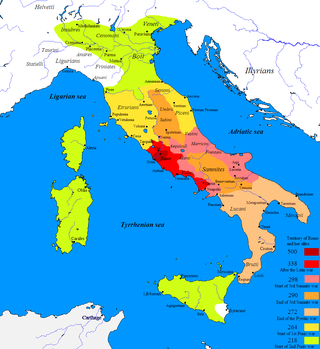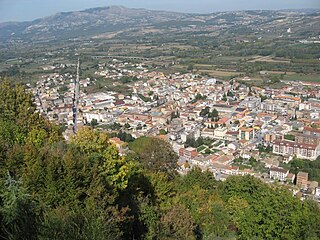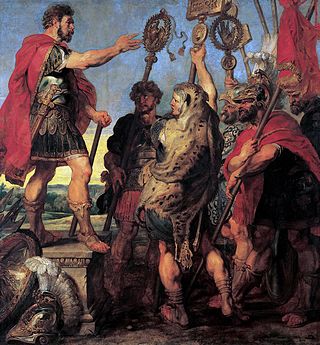Related Research Articles

Quintus Fabius Maximus Verrucosus, surnamed Cunctator, was a Roman statesman and general of the third century BC. He was consul five times and was appointed dictator in 221 and 217 BC. He was censor in 230 BC. His agnomen, Cunctator, usually translated as "the delayer", refers to the strategy that he employed against Hannibal's forces during the Second Punic War. Facing an outstanding commander with superior numbers, he pursued a then-novel strategy of targeting the enemy's supply lines, and accepting only smaller engagements on favourable ground, rather than risking his entire army on direct confrontation with Hannibal himself. As a result, he is regarded as the originator of many tactics used in guerrilla warfare.
During the 290s BC, Hellenistic civilization begins its emergence throughout the successor states of the former Argead Macedonian Empire of Alexander the Great, resulting in the diffusion of Greek culture throughout the Levant and advances in science, mathematics, philosophy, etc. Meanwhile, the Roman Republic is embroiled in war against the Samnites, the Mauryan Empire continues to thrive in Ancient India, and the Kingdom of Qin in Ancient China, the one which in the future will conquer its adversaries and unite China, begins to emerge as a significant power during the Warring States period.

The year 305 BC was a year of the pre-Julian Roman calendar. At the time, it was known as the Year of the Consulship of Megellus and Augurinus. The denomination 305 BC for this year has been used since the early medieval period, when the Anno Domini calendar era became the prevalent method in Europe for naming years.

The First, Second, and Third Samnite Wars were fought between the Roman Republic and the Samnites, who lived on a stretch of the Apennine Mountains south of Rome and north of the Lucanian tribe.

Lucius Cornelius Scipio Barbatus was one of the two elected Roman consuls in 298 BC. He led the Roman army to victory against the Etruscans near Volterra. A member of the noble Roman family of Scipiones, he was the father of Lucius Cornelius Scipio and Gnaeus Cornelius Scipio Asina and great-grandfather of Scipio Africanus.
Quintus Fabius Maximus Rullianus was a patrician, politician and soldier of the Roman Republic during the fourth and early third century BC. He was the son of Marcus Fabius Ambustus, of the patrician Fabii, was five times consul, dictator once, censor, and a hero of the Samnite Wars. He was brother to Marcus Fabius Ambustus, who was named after their father, and the grandfather of Quintus Fabius Maximus Verrucosus.
The gens Fulvia, originally Foulvia, was one of the most illustrious plebeian families at ancient Rome. Members of this gens first came to prominence during the middle Republic; the first to attain the consulship was Lucius Fulvius Curvus in 322 BC. From that time, the Fulvii were active in the politics of the Roman state, and gained a reputation for excellent military leaders.

Lucius Papirius Cursor was a celebrated politician and general of the early Roman Republic, who was five times consul, three times magister equitum, and twice dictator. He was the most important Roman commander during the Second Samnite War, during which he received three triumphs.

Lucius Minucius Esquilinus Augurinus was a Roman politician who was consul in 458 BC and decemvir in 450 BC.

The Battle of Lautulae was fought in 315 BC during the Second Samnite War, opposing the Roman Republic and the Samnites, who defeated the Romans.

The Battle of Bovianum was fought in 305 BC between the Romans and the Samnites.

Publius Decius Mus, of the plebeian gens Decia, was a Roman consul in the years 312 BC, 308 BC, 297 BC and 295 BC. He was a member of a family that was renowned for sacrificing themselves on the battlefield for Rome.

The Battle of Geronium was a battle in the summer and autumn months of 217 BC fought between Ancient Carthage and the Roman Republic in the Second Punic War. It resulted in a decisive victory for the Carthaginian forces led by the renowned general Hannibal Barca, increasing his confidence while stranded on the Italian Peninsula.

The gens Minucia was an ancient Roman family, which flourished from the earliest days of the Republic until imperial times. The gens was apparently of patrician origin, but was better known by its plebeian branches. The first of the Minucii to hold the consulship was Marcus Minucius Augurinus, elected consul in 497 BC.
Marcus Minucius Rufus was a Roman consul in 221 BC. He was also Magister Equitum during the dictatorship of Quintus Fabius Maximus Verrucosus known as Cunctator.

The gens Postumia was a noble patrician family at ancient Rome. Throughout the history of the Republic, the Postumii frequently occupied the chief magistracies of the Roman state, beginning with Publius Postumius Tubertus, consul in 505 BC, the fifth year of the Republic. Although like much of the old Roman aristocracy, the Postumii faded for a time into obscurity under the Empire, individuals bearing the name of Postumius again filled a number of important offices from the second century AD to the end of the Western Empire.

Lucius Postumius Megellus was a politician and general during the middle years of the Roman Republic. Reportedly an arrogant and overbearing man, he was elected consul in 305 BC. The Second Samnite War was ongoing, and as consul he led troops against the Samnites. He defeated them at the Battle of Bovianum and took the town of Bovianum, which caused the Samnites to sue for peace, ending the war. Megellus was awarded a triumph.
The gens Gellia was a plebeian family at ancient Rome, where they settled after the Second Punic War or earlier. The first of the Gellii to obtain the consulship was Lucius Gellius Poplicola, in 72 BC, but the most famous member of this gens is probably the grammarian Aulus Gellius, who flourished during the second century AD.
Marcus Fulvius Curvus Paetinus was a Roman suffect consul in 305 BC with Lucius Postumius Megellus. He was elected to replace Tiberius Minucius Augurinus, who died in office.